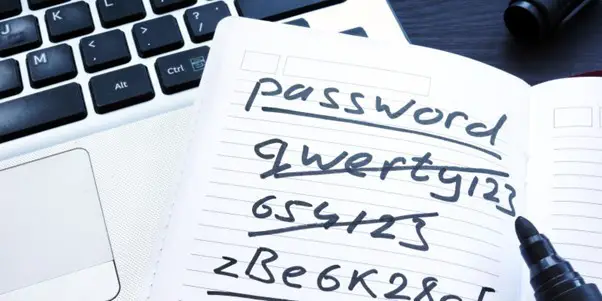Don’t let your browser remember your passwords guide, Internet users tips, Safe account online protection
Don’t let your browser remember your passwords advice
24 May 2022
Passwords are incredibly important in our modern society. However, their importance is often overlooked by many internet users. People tend to choose passwords they relate to because it’s easier to remember, but unfortunately, this also makes it easier for hackers to infiltrate your accounts.

image courtesy of Vitalii Vodolazskyi / Shutterstock.com
Why You Shouldn’t Let Your Browser Remember Your Passwords
If you’re using strong and unique passwords for each of your accounts — which you should be — it can be tempting to ask your device to remember each of your logins for you. However, this is not always the best idea, and you’ll see exactly why that is later on in this article.
If you want to ensure that your accounts are kept secure, you need to use a third-party password manager. If you’re looking for one, we’ve found some of the best password managers on the market. If you’re not convinced as to why you need one of these premium password managers, keep reading to find out why it’s so crucial.
Why Default Password Managers Put You at Risk
We all know how important it is to use strong and unique passwords. Studies have shown that the strongest passwords are made up of entirely random words or phrases. You should also be using numbers and symbols in your passwords to make sure that they are even stronger.
You also need to remember to use different passwords for each of your accounts. Many people tend to use the same passwords for different accounts, which could leave multiple accounts at risk of being breached. You need to make sure that you use a different password on every account — but that could be difficult to remember right?
Luckily though, our devices have got us covered with convenient built-in password managers. Whether it’s a browser like Google Chrome or your device’s operating system like Apple’s iOS, it’s tempting to let your device save your login credentials for you.
There’s no need to remember which passwords you need to use for each website, and it makes logging into your accounts a breeze. All you need to do is let your device enter your login credentials for you and you’ve got access to your account.
It’s not always great though. As convenient as these default password managers are, they are not secure. Many of these do not require you to enter a password in order to see your login credentials for each website, which means that a cybercriminal could easily breach them and get their hands on all of your login credentials.
Premium Password Managers
If you want to keep your strong and unique passwords secure, you need to make sure that you use a premium password manager instead. These third-party password managers are much more secure than the default password managers you’ll find on your device as standard.
What makes them so secure is the fact that all of your login credentials are locked away in a virtual vault. You are the only person who has an access key to this vault, and it’s not a password that you can create yourself. You are given a unique “master key” that is randomly generated.
If your account with the password manager is accessed from a different device or a different location, you will need to use the master key to gain access to your account. This means that a cybercriminal won’t be able to access your login credentials and infiltrate your accounts.
It’s always a good idea to stick with premium password managers from well-known companies as these are much more secure and they are legitimate. Cybercriminals can sometimes create their own “password managers” and allow users to download them for free. They can then use these fake password managers to steal your passwords or install more malicious software on your device.
How Cybercriminals Steal Passwords
Over the years, cybercriminals have come up with various strategies to steal people’s login credentials. It’s important to understand these tactics as they are very common, and falling victim to one of these scams can have devastating results.
The tactic you need to keep your eyes out for is phishing scams. Phishing has been common ever since the dawn of the internet era, but they have come a long way since the old Nigerian Prince scam that we love to laugh about these days. In fact, phishing scams are so serious in our modern society that anyone can fall victim to them if they are not careful.
Phishing scams are mostly done through email. The hacker will send an email to their victim urging them to interact with a link. Once the victim clicks on the link they will be taken to a fake website that has a keylogger installed on it. Anything that the victim types into the website — whether it’s login credentials or bank account details — will be given straight to the cybercriminal.
Phishing scams have become much more dangerous in recent years though. That’s because cybercriminals are using social engineering to create even more convincing phishing scams than ever before. Social engineering is when the hacker poses as a person or a company that the victim might know and trust, thus making them more likely to interact with the phishing scam.
For example, a cybercriminal might send an email to a victim pretending to be Netflix. The email will be incredibly convincing because it will have the same logo and color schemes as Netflix, so the average internet user won’t suspect anything suspicious. The email will inform the victim that they need to update their billing information or risk having their account suspended — they will also be told to follow the link in the email to be taken directly to the billing page.
However, the link provided in the email will take the victim to a fake website that has been set up by the cybercriminal. Anything that the victim types into the website will be given to the cybercriminals, and the victim will be none the wiser.
Don’t let your browser remember your passwords summary
It’s important that you always double-check the email address of the emails that you receive — anything that is not official (Gmail account for example) could likely be a phishing scam. You must also ensure that you do not click on any links in emails or social media messages unless you are sure that they are legitimate.
Another tip is to keep an eye out for any spelling or grammatical errors in the email, as well as a generic greeting rather than addressing you by your name.
Comments on this guide to Don’t let your browser remember your passwords article are welcome.
Buying Property Articles
Buying Property Posts
7 Tips Before Buying a Luxury Home
Future of house buying advice from leading experts
4 Tips For Buying Luxury Property In London
Buildings
Contemporary Property Articles
Comments / photos for the Don’t let your browser remember your passwords advice page welcome






